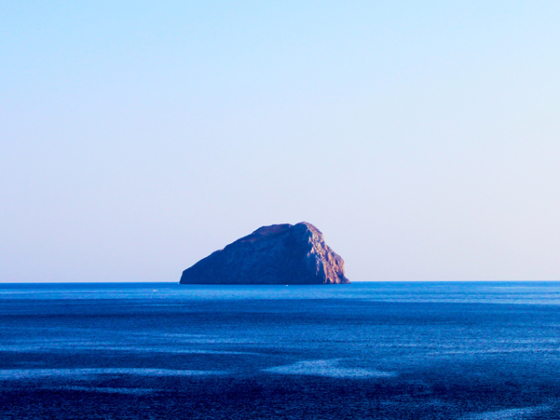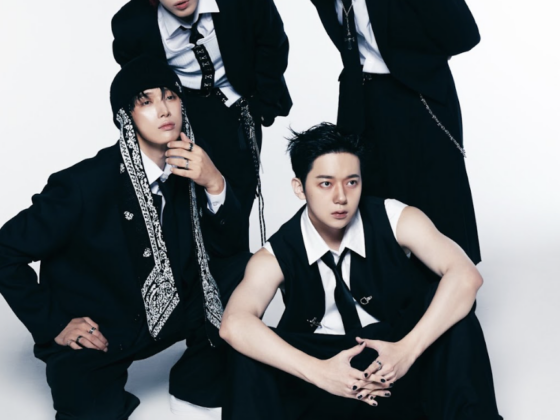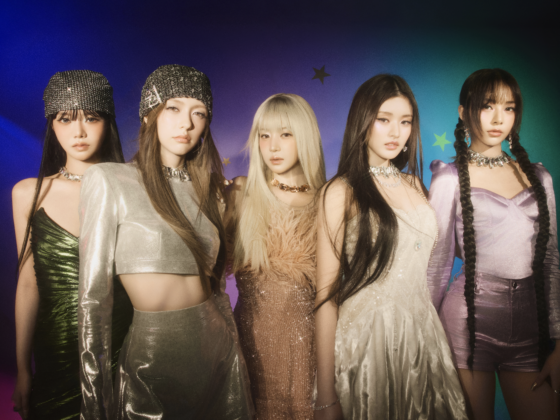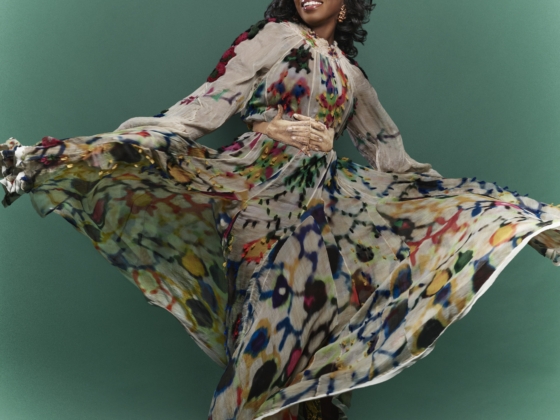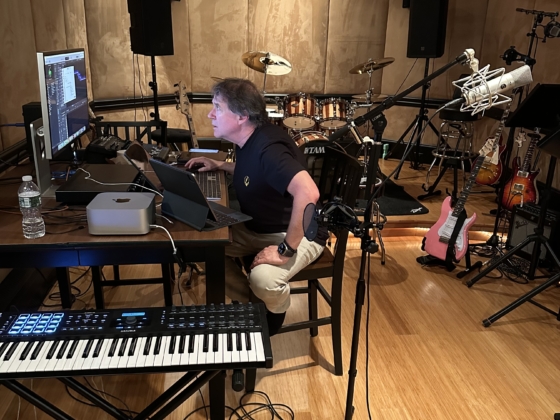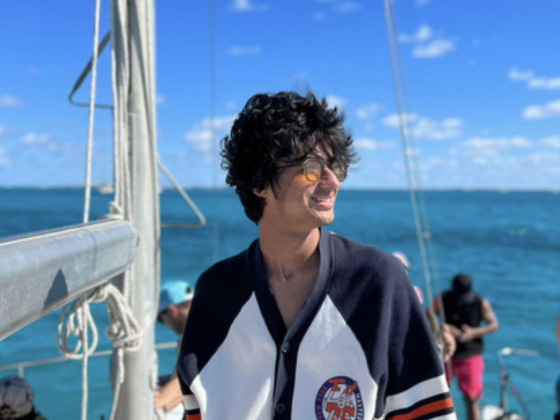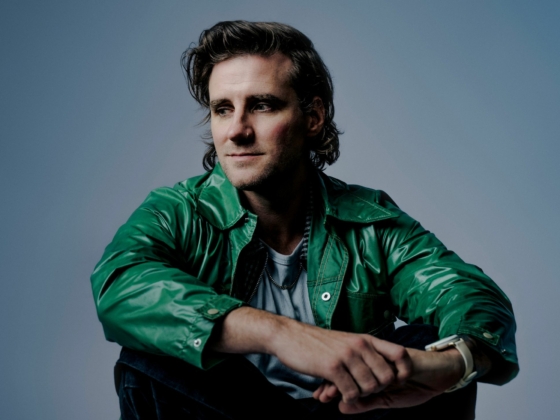Following the release of her 2015 single "War Paint", New Jersey singer-songwriter FLETCHER has released an EP and seen her songs receive millions of streams across different platforms. In the last month, she embarked on a headlining tour and released a new single with a fresh sound called "You Should Talk".
Where her debut EP Finding FLETCHER featured pop songs dipping their toes into the waters of country music, "You Should Talk" explores new musical landscapes that would excite any listener as to what she has coming next. I had the opportunity to catch up with FLETCHER at the All Things Go Fall Classic in Washington D.C. earlier this month where we talked about her music and how she got to where she is now. A quick note: Our conversation took place underneath a Yoko Ono Mural which read "Relax. Your heart is stronger than you think!" That phrase stuck with me while writing this, and felt appropriate considering what we had discussed. Our conversation can be found below.
EM: With "You Should Talk", I really like how you’ve kind of taken your whole sound and sort of developed it into something different that still feels like a progression of your old sound. What led you to make that decision and push into that direction?
FLETCHER: It wasn’t as much of a decision as it was experience and life changing. I mean I wrote that music on the EP like two years ago now, so I don’t know I've just gone through life and had new experiences and things have changed. I want to talk and write about different things. And obviously there is going to be some consistency because like I’m still the same person. But I’ve definitely feel like I’ve evolved and matured and I feel like the sound has also reflected that.
EM: Do you have a specific memory of what made you want to pursue music professionally? Is there an inciting incident for you?
FLETCHER: I don’t know if there really… that’s a good question. Someone asked me that before but music has just been a part of my life for literally as long as I can remember and I was singing before I was ever talking. My mom had put me in piano lessons and I just wasn’t picking it up super fast because I have I can’t focus on something for more than ten minutes at a time. But singing was the one thing that I wanted to keep getting better at. She put me in piano lessons the piano teacher said to my mom, "She has been trying to learn ‘Mary had a little Lamb’ for last six months and she doesn’t practice. I think we should try singing." I was about 5 years old when that happened.
EM: So you were saying you were singing before you were talking. What did that sound like?
FLETCHER: It was a lot of broadway show tunes that I absolutely didn’t know the lyrics to and I was making up my own fake words to. My parents actually didn’t really listen to a lot of music so I didn’t have a lot of resources but the two CDs that they had, which were a Celine Dion CD and a Bob Marley CD, which is the two most random combination of fucking music you can have (laughs). And so I would listen to those on repeat. Still to this day I know every Bob Marley song because it was the only two CDs that we had. I would just try to copy Celine Dion riff for riff and note for note and my mom was like "You’re going to hurt yourself. I think I should put you in voice lessons." So that’s what we did.
EM: Do you think that experience of mimicking what you were hearing contributed to your skill with melody? Like when I listen to you music that’s one of the things that really stands out.
FLETCHER: Thank you. It could be. I mean, I think I developed such an appreciation for the voice at such an early age in my life. My grandma sang to me as a little kid all the time and I have early memories of that. I listen to Celine Dion and Whitney Houston and I was also classically trained in opera from an early age. Really big voices with a lot of technicality was something that was so interesting to me and the voice itself as an art and the way it’s able to move and like hop from melodies is something that because I had that training from such an early age that I wanted to like experiment melodically with in my songs. I actually have never really thought about that but I’m sure that’s definitely subconsciously played a role in the way that I write today.
EM: With your writing is song writing something that came to you really easily or was that a discipline you had to work on?
FLETCHER: No. It actually really wasn’t. and I remember up until college I wanted to be a songwriter so badly. I went to the Clive Davis institute of Recorded Music at NYU and I was amongst all these really (naturally) talented writers, and I remember having a text conversation with my mom one day being like "I don’t think I have what it takes to be a songwriter. I don’t think I’m good enough." And then I went down to Nashville and I started this music and these lyrics and words just started pouring out of me. It was also a lot of the producer, Jamie Kenney, that I worked with down there in Nashville who just sort of liked helped me focus in and zero in on a direction and become a better writer. Now, I consider myself a songwriter just as much as I do an artist, which is very crazy that that sort of happened over the last four years. I would write songs as a little kid about what I was having for dinner and stuff but… I definitely have come a long way since writing about my spaghetti dinners.
EM: (laughs) What were those songs? Those spaghetti dinner songs?
FLETCHER: They were just like I.. I don’t know I would just like make up stuff about what we were having for dinner like what movie my family and I would watch after. I don’t know just bull shit things you think about as a little kid.
EM: Do you have any focuses outside of music?
FLETCHER: Music is obviously my number one passion, but I’m focused on eating (laughs). I’m focused on having a good time with friends. I don’t know, I have a black belt in karate, I snowboard with my brother. I'm a big foodie and a family person. And I also studied an entrepreneurial track while I was at NYU and a mental health studies minor. I’m very passionate about mental health and am really interested in those kind of conversations. I kind of wear a few different hats, I guess.
EM: Do you think that there’s an importance when you’re making music to have other interests that feed into your main art that you’re working on?
FLETCHER: Yeah because I feel like in order to get inspiration and to write about it you need to involve yourself and push the boundaries with regards to your comfortability with other things. I took an African dance class while I was at NYU and I’m literally the worst dancer in the entire world and I have no rhythm and I can’t remember choreography at all and I hated every second of it because I had to do a solo performance at the end. That honestly goes down at the most uncomfortable day in the history of my life because it scared the shit out me and that’s why I did it. I think it’s important because it gives you inspiration to write about being scared shitless doing something you never thought you’d do before.
EM: Do you think there’s a necessity to making yourself uncomfortable to get to the good stuff?
FLETCHER: I do. I think if you stay in your comfort zone your entire life you are never really going to find out what your fullest potential is so I think it’s important to push the envelope in that way. And it’s so scary: it’s like no one wants to do that sometimes but it’s how you grow and become a better person and learn from experience and I think I think that’s really important.
EM: What’s a piece of advice to someone who is interested in this as a career whose looking at this like a big abstract thing? Like where do I start, there’s this massive machine of like a publicist who talks to a manager who talks to …
FLETCHER: I remember it was such a confusing thing even when I started too. I was like, god there is so many team members how do you even begin to find somebody to help you do this. I think if you want to be an artist that the most important thing is to start working on music and start putting stuff out there. Find a friend who really believes in you. I mean like my manager and I have been friends since we were 13 years old. Like we met when we were little kids and we’ve been working together ever since. And it’s about finding that one person that’s so passionate and you can start from nothing. We didn’t know what the fuck we were doing and but it’s about finding those people that lift you up and support you and have similar passions and dreams and just figuring it out, like keep doing it, keep going, cold email people. Eventually someone will respond. Ummm and people, you know and if people are reacting to your music if you have good music, it’s like cool. That’s the hard part. Then you know, figure out a way to connect with people and surround yourself with people that really love you and respect your art and believe in the project. That’s the most important thing.
Interview edited for length and clarity.
Photo Credit: Sarah Heaton
Connect with FLETCHER: Facebook | Twitter | Instagram | Website


